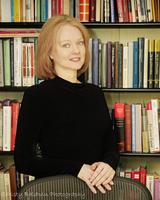English professor, colleagues receive grant to study earliest texts published in English language

"The project investigates the richly international world of early print culture, and more specifically, the crucial role of translation in the wake of the invention of the printing press and movable type," Coldiron said.
An English professor in Florida State University's College of Arts and Sciences is part of an international team that has won a prestigious academic grant to study how texts were translated from other languages and printed in England during the Renaissance.
Anne Coldiron is one of four researchers — two others from Canada and another from England — who together received an Insight Grant, awarded by the Social Science Research Council of Canada (SSHRC). The SSHRC is Canada's federal agency that promotes and supports postsecondary research and training in social sciences and humanities. The council is similar to the National Endowment for the Humanities in the United States but broader in disciplinary scope.
"I'm really grateful to FSU for supporting me wonderfully during my research," Coldiron said. "The competition (for the Insight Grant) was especially tough this year, we are told, so I am very grateful to be part of a fully funded team."
The three-year Insight Grant, valued at about $108,000 in U.S. currency, will support a project titled "Translation and the Making of Early Modern Print Culture (1473-1660)." The first book was printed in English in 1473, while the English monarchy was restored in 1660.
"The project investigates the richly international world of early print culture, and more specifically, the crucial role of translation in the wake of the invention of the printing press and movable type," Coldiron said. "Translation and the new technology of printing worked synergistically to make possible the publication of all kinds of texts. Translation made foreign works, ideas and aesthetics available, and the new printing technology accelerated their production and distribution."
Coldiron has already conducted much of the research for her portion of the project. Already, she has made a discovery that challenges previous conceptions of early English literature — and perhaps of English culture itself.
"One finding shows that translations from French to English outnumber by far the translations from Italian, overturning a major belief in this field," she said.
Coldiron's colleagues on the Insight Grant project are principal investigator Marie-Alice Belle and Brenda M. Hosington, both of Université de Montréal, and Warren Boutcher of Queen Mary University of London. The four, all scholars of the English Renaissance, met during various academic conferences over the years and realized that their shared interests and individual areas of expertise might make for a successful research project.
Ultimately, the researchers look forward to publishing their findings and presenting their work at a major academic conference. It may also be the basis of training in research methodologies for graduate students in FSU's History of Text Technologies (HoTT) program, part of the Department of English.
HoTT is an interdisciplinary certificate program that combines studies in the history of the book and media cultures. The program's curriculum explores the changing material and aesthetic technologies of cultural transmission in scribal, print, visual, and digital forms.
"This grant is splendid news both for Professor Coldiron and for our students in the History of Text Technologies program," said Eric Walker, chairman of FSU's English department. "The collaborative nature of both the research objects and the research team is an excellent reminder that literary production and literary study is almost never the solitary quest of romantic caricature."
In addition to the Insight Grant project, Coldiron just finished work on her third book, "Printers Without Borders: 'Englishing' Texts in the Renaissance," that analyzes the early English printers' and translators' complex, resistant appropriations of foreign texts.
"Emerging nationhoods, emergent literary cultures and a range of societal changes took place because of these two mutually catalytic processes, translation and printing," she said. "Scholars disagree on whether this constituted a 'revolution' or an evolution, but there's no doubt that each process, printing and translation, fueled and enhanced the other."
Coldiron's main area of academic expertise is late-medieval and Renaissance literature; she has written on such authors as Chaucer, Spenser, Sidney, Shakespeare, Donne and Milton. Because of her research focus on French-English literary relations, translation and early printing, she joined FSU's HoTT program in 2007.

